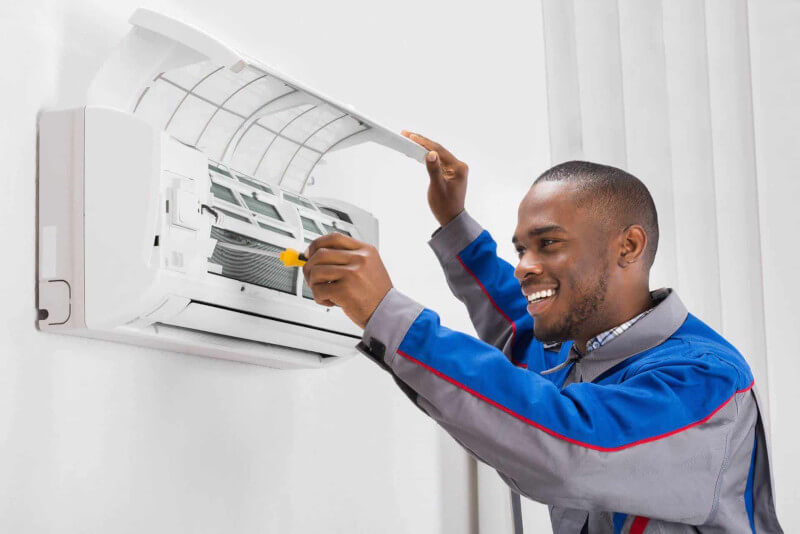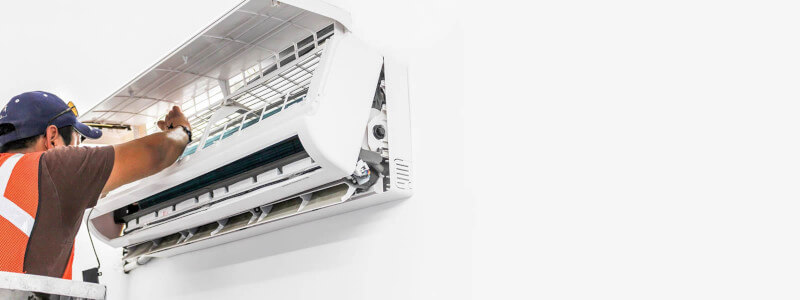Spring and Autumn are ideal times to schedule an HVAC inspection, as these times correspond with the use of your heating and cooling systems, respectively. If the blower (the unit’s internal motor) and thermostat are both in good working order, your home will maintain a comfortable temperature at all times.
Can I Ignore the Outdoor Condensing Unit?
While the expert will check the inner workings, you must check on the outdoor unit every couple of weeks and clear away any foliage, weeds, or other debris that may have accumulated around it.
Can You Explain What Air Ducts Are and How They Work?
Ducts are the conduits through which conditioned air is distributed throughout a building. Professionals should clean, shield, and seal ducts to prevent contamination. Air leaks in the ductwork can reduce the efficiency and cleanliness of the supplied air. An increase in efficiency of up to 20% can be achieved by sealing ducts in incomplete areas (such as attics, cellars, and crawl spaces).
I’m Curious About the Cost-saving Potential of Adjusting My Thermostat
When you set and program a thermostat, you can prevent your HVAC system from constantly running at full blast. With appropriate use, you can cut your annual electricity costs by R 3000.
When Should Filters Be Changed in an HVAC System?
For 3 cm filters, you should replace them every 3 months (each season), or more regularly if you have animals, smoke, or allergens in the home. It is important to measure the filter(s) in your home or apartment before making a purchase. Some places have multiple filters.

A dirty filtration system can boost electricity costs and harm your devices, resulting in premature failure, making filter replacement a top DIY action item for a fully functioning HVAC system. And consider this: every time you swap out the filter, you’re contributing to the quality of air in your home.
Does a Larger Heating and Cooling System Provide Better Comfort?
The size of your home will determine the size of the HVAC system you need. If the system is too small, it will be stressed excessively, while if it is too large, it will complete the task, but at great expense and inefficiency.
To Zone or Not to Zone—that is the Question!
In a house with a ducted HVAC system, “zoning” is the process of separating the building into sections with similar heating and cooling requirements. Zoning allows you to increase or decrease the temperature in specific areas using additional thermostats, allowing additional comfort while using less electricity.
Should I Get a Thermostat With Programmability?
You can set your smart thermostat to lower the indoor temperature while you are away or at work, saving money on heating and cooling costs. They can cut down on your electricity usage and costs.
Which HVAC System is the Most Effective?
It all comes down to what you’re looking for. Split systems, hybrid systems, duct-free, and bundled HVAC units are the 4 most common varieties. These days, the most popular “one size fits all” option is the split system. Hybrid systems are very similar, but they provide the added benefit of letting homeowners choose between gas and electricity as a source of heat, reducing their heating bills while also helping the environment. Individual units in separate rooms make ductless systems ideal for additions, garages, and other structures that don’t have ductwork. Packaged systems are suitable for smaller homes in hotter climates due to their reduced power output.
How Long Do Different Types of Heating Systems Typically Last Before They Need to Be Replaced?
Heat pumps have a life expectancy of 12-15 years, while traditional condensing units last 15-18 years. Regular maintenance is a surefire way to increase the lifespan of your machinery.
When Should I Schedule Maintenance for What Pieces of Machinery?
All heating and cooling systems, including furnaces, heat pumps, and air conditioners, should be serviced twice yearly at a minimum. Prevent potential issues by having maintenance done before the cold and hot weather sets in.
When Winter Comes, Must I Cover My Exterior Condensing Unit?
Don’t cover it if it has a heat pump or runs on electricity instead of gas. Putting a cover or tarp over your natural gas furnace’s traditional outdoor condensing unit can help prevent weather from damaging the unit’s inner workings.
When Renting a Storage Space, What Size System Do I Need?
There isn’t a simple solution to this problem. The size of the heating and cooling system you need depends on several factors. What size of the unit is needed is often dependent on factors such as the type of home you have, the thickness of its walls and insulation, the amount of attic space, and so on. If the system is too large, the home may become too humid, leading to condensation and cold growth. Overusing and driving up your electrical costs is what happens when your system is too small. A trained professional is the only one who can tell you what size cooling and heating system is appropriate for your household.
Do I Need a New Indoor Unit if I Get a New Outdoor Unit?
Yes, that is the case in nearly all circumstances. You must substitute the indoor and outdoor units at the same time for a variety of factors. First off, indoor and outdoor components of air conditioning and heat pumps are designed to be used in tandem with one another. There is a risk of decreased productivity and effectiveness when combining different types of units.

Also, if you purchased both the indoor as well as the outdoor units simultaneously, the indoor unit’s valuable life span will likely overlap with that of the outdoor unit. Putting off substituting the indoor unit will only result in higher electricity costs and a more drawn-out replacement process. If you buy an indoor and an outdoor unit together, you’ll be covered by a comprehensive warranty that will reduce the out-of-pocket expense for any necessary repairs during the warranty.
For What Reasons Should I Switch From an R-22 Outdoor Unit to an R410a One?
R-22 liquid coolant and devices are being phased out. It’s going to be more challenging and more costly to locate spares and refrigerants for older R-22 units in the long term, so substituting your unit now could save you time and money in the long run. Additionally, if you’re wanting to take shortcuts by simply replacing the R-22 refrigerant with the R410A, without substituting your entire unit, you are going to sit with even more problems. According to GreeDirect, “These two refrigerants are not interchangeable since they have different characteristics. If you alter the refrigerant, you risk damaging the compressor and other components.”
Why Do Air Conditioners Sometimes Freeze Up?
There are several potential causes for an air conditioner to freeze up, and only a qualified HVAC technician will have the knowledge and equipment to get it running again. In a twist of fate, low refrigerant can lead to a freeze-up. Leaks in your system’s refrigerant lines can develop from regular wear and tear. Low pressure within the system is what induces your unit to freeze up when the refrigerant is lost.
Despite low freon levels, the refrigerant must grow to the same degree. The greater the rate of expansion, the lower the resulting temperature. The airborne moisture all over your unit’s evaporator coil will freeze in the colder temps, ultimately frosting up the coil and hindering its function. If the evaporator coils are dirty, the system may lose air circulation and seize up. Frozen pipes can also be the result of faulty blower motors.
Where Can I Look Up the Warranty Status of My Product?
Find the date your gadget was made by looking at the label on the outside of it. Equipment that’s less than 5 years old is probably still under warranty. To find out more, you can get in touch with the maker.
How Can I Keep My Device Running for as Long as Possible?
It’s only natural to want your heating and cooling system to operate for as long as possible after making such a sizable financial commitment. Turning the thermostat up or down to adjust consumption while you’re away from home is a good practice. If you regularly replace your air filters, you won’t have to worry about them getting clogged. If you get checkups regularly, you can head off any developing problems. All of these are examples of the kinds of inquiries that HVAC technicians field daily. It is wise to consult experts when you have concerns about your cooling and heating systems.
In conclusion, understanding the ins and outs of your HVAC system can help you maintain optimal comfort in your home while also saving money on energy bills. By addressing common questions related to HVAC, we hope this guide has provided valuable insights and guidance to help you make informed decisions about your heating and cooling system. Whether it’s choosing the right size unit, adjusting your thermostat settings, or scheduling regular maintenance, taking proactive steps to optimise your HVAC system can go a long way in ensuring a comfortable and efficient living space.

